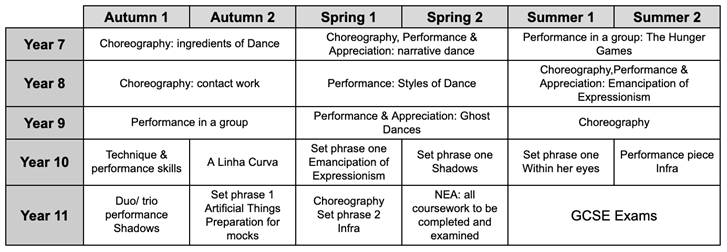DRAMA
Curriculum Purpose
Teaching drama for its intrinsic value
Drama is a powerful tool that has for centuries communicated entertaining stories and challenging messages across the world. Through drama we want every student to feel inspired to express the world around them with confidence and creativity.
We are all subject experts
Our approach to curriculum will equip our students with the knowledge (Tacit, Procedural, Declarative) across a range of playtexts and styles of theatre making to critically engage in creating, performing and responding.
The needs of our community
We will expose students to a range of contexts and themes that broaden their cultural capital, providing examples and modelling to ensure access for all.
Preparing for success
We will provide pupils with a solid foundation in acting and design, developing their oracy
to equip them for further study in the subject and prepare them for work in creative industries. This will be supported by our wide range of performance opportunities and links with the Bristol Theatre Community.
Curriculum Rationale
What do we teach and why do we teach it?
Drama gives students the opportunity to work in groups and discuss, rehearse and perform many different playtexts. We have chosen to focus on at least two key playtexts in each year group so that students are exposed to a variety of high quality examples of theatre practice. This in turn broadens students' knowledge of what theatre looks like and how they might like to express themselves. They then use this knowledge of the playtexts, including characters, plot, themes and style, to create and perform their own pieces, learning to express themselves.
We have chosen to focus Year 7 on key vocal and physical performance skills that will be needed throughout their studies in Drama, and essential to creating convincing and confident performances. Unlike many schools we have then decided to explore design roles in the theatre and different styles of performance in Year 8 and 9 as we want to broaden pupils’ knowledge of creative industries and the world of theatre. As the curriculum progresses into Phase 2, students use their knowledge of playtexts, styles and performance techniques to make informed decisions, thinking critically about their intent for communicating to an audience.
Why do we teach it in that order?
The drama department has built a ‘spiral’ curriculum that visits new knowledge and performance skills throughout the Autumn and Spring terms. These skills are then revisited in the Summer terms in a new context to reinforce and apply learning. The complexity of learning increases throughout Phase 1 and 2 through combining different performance skills with a clear intention to create meaning to the audience. Pupils learn to describe, explain, analyse and evaluate work throughout their curriculum journey, so that when they leave Trinity they can reflect on their own work and the impact it can have on others.
Curriculum Overview

